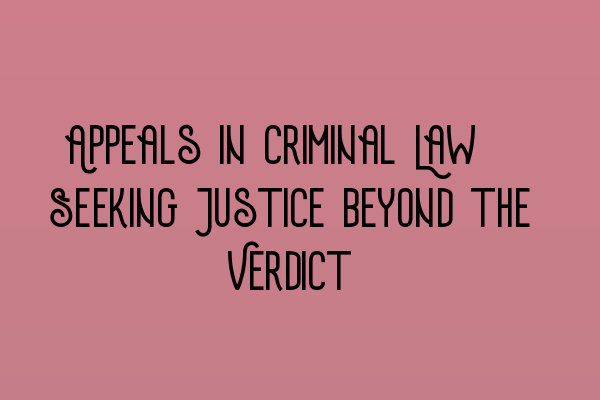Appeals in Criminal Law: Seeking Justice beyond the Verdict
In the realm of criminal law, the verdict of a trial can have far-reaching consequences for the accused. Whether it ends in a conviction or an acquittal, the outcome of a criminal trial is not always set in stone. There exists a legal avenue to challenge the verdict and seek justice through the process of an appeal. Today, we will delve into the intricacies of appeals in criminal law and explore how they can provide individuals with a chance to correct potential miscarriages of justice.
Understanding Appeals in Criminal Law
An appeal is a mechanism through which a convicted individual or their legal representative can request a higher court to review the original trial judgment. The purpose of an appeal is not to relitigate the entire case but to identify and rectify any errors of law or procedure that may have influenced the outcome. It is vital to note that appealing a verdict does not automatically guarantee a different outcome; however, it offers the opportunity for a fresh evaluation of the case by independent judicial authorities.
Grounds for Appeal
Appeals can be made on various grounds, depending on the jurisdiction and legal system in which the trial took place. Some common grounds for appeal in criminal law include:
1. Errors in Law: If the defense can demonstrate that the trial judge made a significant error in interpreting or applying the law, it may form a solid basis for appeal. This could include misinterpretation of criminal statutes, improper instructions to the jury, or the failure to consider important legal precedents.
2. Procedural Irregularities: Appeals can be sought if there were procedural irregularities during the trial that impacted the fairness or integrity of the process. This could encompass violations of due process, improper admission or exclusion of evidence, or the misconduct of prosecutors or jurors.
3. Insufficient Evidence: If the defense can present compelling arguments that the evidence presented during the trial was insufficient to support the conviction, it may justify an appeal. This could involve challenging witness credibility, flawed forensic analysis, or the failure to meet the burden of proof.
The Appeals Process
The appeals process is a complex and nuanced procedure that varies from jurisdiction to jurisdiction. However, it generally involves the following key steps:
1. Notice of Appeal: The first step is to file a formal notice of appeal, informing the higher court of the intention to challenge the verdict. This must be done within a specified timeframe following the trial judgment.
2. Record Preparation: The lower court is responsible for preparing a complete record of the trial, including the transcripts of proceedings, exhibits, and any relevant documents. This record will be crucial for the appeal process, as it forms the basis for the higher court’s review.
3. Briefs and Oral Arguments: Both the defense and prosecution will have an opportunity to present written legal arguments, known as briefs, to the higher court. These briefs outline their positions on the appeal issues and refer to relevant legal authorities. Oral arguments may also be held, allowing the parties to further elucidate their positions and answer any questions from the appellate judges.
4. Appellate Decision: After careful consideration of the briefs, oral arguments, and the lower court record, the appellate court will render its decision. This decision can come in various forms, such as affirming the lower court’s judgment, reversing it, or ordering a new trial.
The Importance of Legal Representation
Navigating the appeals process requires a thorough understanding of criminal law, procedural rules, and persuasive legal writing skills. Given the complexities and potential consequences involved, seeking legal representation from experienced criminal law solicitors becomes imperative.
At SQE Criminal Law & Practice Law UK, our team of dedicated solicitors specializes in criminal appeals. With their wealth of knowledge and courtroom expertise, they can analyze the trial record, identify viable appeal grounds, and craft persuasive legal arguments on your behalf. Our solicitors will guide you through every step of the appeals process, ensuring your rights are protected and giving you the best chance at seeking justice beyond the initial verdict.
Conclusion
Appeals in criminal law provide a vital avenue for individuals to challenge legal errors, procedural irregularities, or insufficient evidence that may have impacted the outcome of their trial. By seeking an appeal, individuals can continue to fight for justice even after an unfavorable verdict. However, due to the complexity of the appeals process, it is crucial to seek legal representation from skilled and experienced solicitors who can navigate the intricacies of the law.
At SQE Criminal Law & Practice Law UK, we understand the importance of appeals in criminal law and have a track record of success in providing comprehensive legal support for our clients. Contact us today to discuss your case and understand how our expert solicitors can help you seek justice beyond the verdict.
